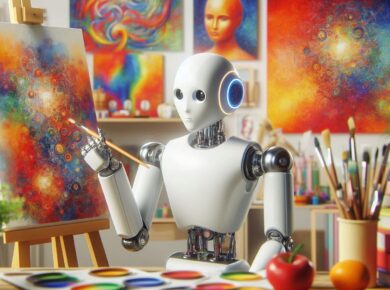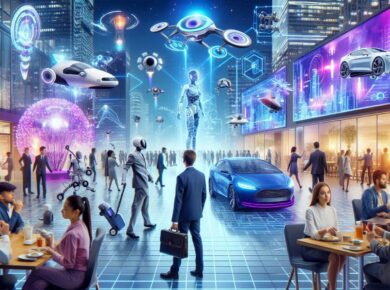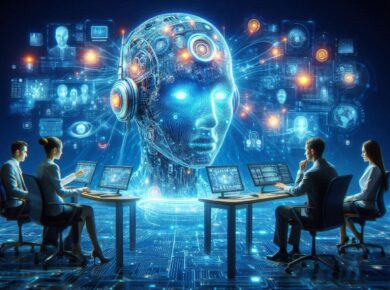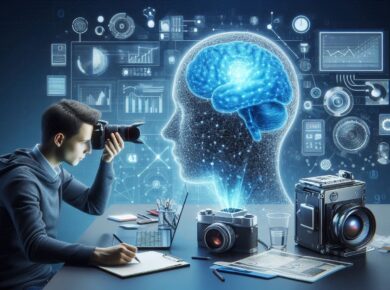Table of Contents
The rapid advancement of artificial intelligence (AI) is transforming industries and redefining the workplace. As we enter an era where machines and algorithms play a crucial role in daily operations, organizations and employees must adapt to thrive in this new landscape. This article explores the implications of an AI-driven world on the future of work and offers insights on how to prepare for these changes.
Understanding AI’s Impact on the Workforce
AI is not merely a trend; it represents a fundamental shift in how work is performed across sectors. From automating routine tasks to enabling advanced data analysis, AI is streamlining operations and enhancing productivity. However, these advancements also bring significant changes to the nature of jobs and required skills.
Key Areas of Impact
- Automation of Routine Tasks:
AI technologies can handle repetitive and mundane tasks with precision and efficiency, freeing up human workers to focus on more strategic and creative responsibilities. For instance, customer service chatbots can manage basic inquiries, allowing human agents to handle complex issues. - Enhanced Decision-Making:
AI can analyze vast amounts of data quickly, providing insights that support decision-making processes. This capability enables businesses to operate more efficiently and respond swiftly to market changes. - Job Transformation:
While some jobs may become obsolete due to automation, many others will evolve. Roles will increasingly require collaboration with AI tools, emphasizing the need for new skills that complement technological capabilities.
Preparing for the AI-Driven Workplace
To navigate the challenges and opportunities presented by AI, both organizations and individuals must proactively prepare for the changing work environment. Here are key strategies to consider:
1. Emphasizing Lifelong Learning
As technology evolves, continuous education and skill development are essential. Employees should seek opportunities to learn new technologies, including AI systems, data analysis, and digital tools. Organizations can foster a culture of learning by providing training programs and resources.
2. Adapting to New Skills Requirements
The demand for technical skills will grow, but soft skills like critical thinking, creativity, and emotional intelligence will remain invaluable. These skills differentiate human workers from machines and are crucial for collaboration in an AI-enhanced workplace.
3. Embracing Change and Flexibility
Change is inevitable in an AI-driven world. Workers must adopt a flexible mindset, embracing new roles and responsibilities as technologies evolve. This adaptability will be key to thriving in a rapidly shifting job landscape.
The Role of Organizations in Shaping the Future of Work
Organizations play a pivotal role in preparing their workforce for an AI-driven future. Here are several ways they can lead the way:
1. Investing in Employee Development
Companies should prioritize employee training and development programs focused on emerging technologies. By equipping employees with the necessary skills, organizations can ensure a smoother transition into an AI-enhanced work environment.
2. Creating Collaborative Work Environments
Encouraging collaboration between humans and AI tools can drive innovation and efficiency. Organizations should design workflows that integrate AI technologies into everyday tasks, fostering a symbiotic relationship between human workers and machines.
3. Promoting Ethical AI Use
As AI technologies become more prevalent, ethical considerations must be at the forefront. Organizations should develop guidelines and policies that ensure responsible AI use, prioritizing transparency and fairness in decision-making processes.
The Future Workforce: Key Trends to Watch
Several trends are shaping the future of work as AI continues to evolve. Keeping an eye on these developments will help individuals and organizations stay ahead of the curve:
1. Remote and Hybrid Work Models
The COVID-19 pandemic accelerated the adoption of remote work, a trend that is likely to continue. AI tools facilitate remote collaboration, enabling teams to work efficiently regardless of location.
2. Rise of the Gig Economy
AI is facilitating the growth of the gig economy, where short-term contracts and freelance work are increasingly common. Workers can leverage technology to find opportunities that match their skills and preferences.
3. Emphasis on Diversity and Inclusion
As organizations adopt AI-driven processes, ensuring diversity and inclusion in hiring practices will be crucial. AI can help identify and reduce bias, but human oversight is necessary to maintain fair and equitable practices.
Conclusion
The future of work in an AI-driven world presents both challenges and opportunities. By embracing a proactive approach to learning and adaptation, individuals and organizations can navigate this evolving landscape effectively. As AI continues to reshape industries and job roles, fostering a culture of collaboration, ethical practices, and continuous development will be essential. In this rapidly changing environment, those who prepare for the future will not only survive but thrive in an increasingly AI-centric workforce.






